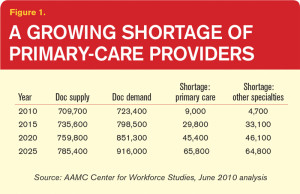
We often read about the Primary Care shortage across the country continuing to grow, especially in states like Massachusetts that have a higher proportion of specialists. Some will argue that its exaggerated but numbers do not lie. Call a local doctors office and find out how long it takes to be seen as a new patient- provided they are even accepting new patients. Well here comes Direct Primary Care with smaller patient panels of 600-1000 patients versus the 2500-3000 of typical insurance based panel sizes, and along with it comes the critics. “You are worsening access,” we are told. Well the reason access to good primary care is poor is because the system is driving medical students- all with plenty of debt- into higher paying specialties. The system is forcing good docs to leave medicine early- whether it’s to retire early, move into administrative positions, or even go work for insurers! I argue that Direct Care can fix this by providing a professionally gratifying, financially rewarding experience so that more students like the ones I teach from Tufts will actually want to go into the field.
Take my current 3rd year Tufts medical student Ian Murphy who states: “I felt that a career in Primary Care would be rewarding but financially unsustainable and mentally draining. After being here for the past 3 weeks, I am now encouraged to look at and explore Primary Care more closely before making a career choice.”
And finally read this email from Salem resident Jennifer Kugel that I received a few months back (with her permission of course). She will be spending a day with me this week.
”
Hello,
I am a perspective medical school student looking to gain insight and experience into the world of medicine. I have an undergraduate degree in Sports Movement Science from Salem State University, and am planning to take the MCAT’s next April and apply by June.
I heard about Dr. Gold’s Direct Care initiative while listening to NPR a few weeks back. I was thrilled to hear that someone locally (I live in Salem) is trying to change the way healthcare is being run. When I got home I looked up his website and read through all of the pages and anecdotal stories. I was quite taken aback to find a doctor who was still interested in doing house-calls and practicing preventative medicine rather then dealing with problems as they come.
As with many people who want to become a doctor, I have envisioned it since I was a toddler. As I have gotten older and taken alternate paths to get my degree, I have continually asked myself why I want to BE a doctor. The answer is still simple; I want to help people. With healthcare operating the way it does, patients are not getting the attention they need, and problems are not caught soon enough. Too many decisions are based off of what people can or cannot afford, and not what is best for their life and lifestyle. To see that an established doctor wants to go out of his way to make the system work better for everyone involved is quite inspiring.
I would greatly appreciate an opportunity to shadow Dr. Gold and gain experience from someone with a vision of a better healthcare system. I am hoping that by the time I finish my medical school experience, that I may be able to take the vision and apply it to my own patient care.
Thank you for the consideration, and I look forward to hopefully meeting Dr. Gold in person soon.
Truly,
Jennifer Kugel
This…is how we actually fix the “access problem.”